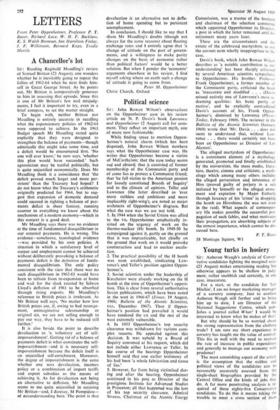Political science
Sir: John Rowan Wilson's observations on the Oppenheimer case in his review article on N. P. Davis's book Lawrence and Oppenheimer (2 August) call for com- ment. They reflect an important myth, one of many now fashionable.
While finding space to mention Oppen- heimer's natural charm (which has been disputed), John Rowan Wilson nowhere says what the Oppenheimer case was. He writes that Oppenheimer became a victim of McCarthyism; that the case today seems sad and absurd; that it consisted of former membership of the Communist party and of some lies to protect a Communist friend; that 'he fell victim to the American passion for loosely constituted Boards of Inquiry' and to the climate of opinion. Teller and Lawrence (the latter described as 'ever more ruthless and ambitious and more implacably right-wing'), are noted as major architects of Oppenheimer's disgrace. But what the case was we are not told.
1. In 1944 when the Soviet Union was allied to the us, Oppenheimer emphatically in- sisted on the urgency of work on the thermo-nuclear (H) bomb. In 1949-50 he campaigned against it, partly on the ground that it was impracticable, but chiefly on the ground that work on it would provoke counteraction and lead to nuclear escala- tion.
2. The practical possibility of the H bomb was soon established, vindicating Law- rence's and Teller's position against Oppen- heimer's.
3. Soviet scientists under the leadership of Kurchatov were already working on the H bomb at the time of Oppenheimer's opposi- tion. This is clear from several authoritative Soviet publications, which have been noted in the west in 1966-67 (Times, 19 August, 1966; Bulletin of the Atomic Scientists, USA, December 1967). Thus if Oppen- heimer's position had prevailed it would have rendered the us and the rest of the west extremely vulnerable.
4. In 1953 Oppenheimer's top security clearance was withdrawn for various com- plex reasons. He appealed against this decision. It was upheld by a Board of Inquiry convened at his request, which did not include either Lawrence or Teller. In the course of the hearings Oppenheimer himself said that one earlier testimony of his had been 'a whole fabrication and tissue of lies.'
5. However, far from being victimised dur- ing and after the hearing, Oppenheimer continued in his post as Director of the prestigious Institute for Advanced Studies in Princeton; all that happened was the loss of his top security clearance. Admiral Strauss, Chairman of the Atomic Energy Commission, was a trustee of the Institute and chairman of the selection committee which oppointed Oppenheimer its Director, a post in which the latter remained until his retirement many years later.
These are the circumstances and the extent of the celebrated martyrdom, to use the current term wholly inappropriate to the case.
Davis's book, which John Rowan Wilson describes as 'a notable contribution to our understanding' has been sharply criticised by several American scientists sympathetic to Oppenheimer. His brother, Professor Frank Oppenheimer, a former member of the Communist party, criticised the book as 'inaccurate and muddled . . . (Davis) missed entirely one of Lawrence's most re- deeming qualities: his basic purity of motive', and he explicitly contradicted Davis's account of his, Frank Oppen- heimer's, dismissal by Lawrence (Physit Today, February 1969). The reviewer in the Bulletin of the Atomic Scientists (January 1969) wrote that `Mr. Davis . . . does not seem to understand that, without Law- rence . . . there would certainly not have been an Oppenheimer as Director of Los Alamos'.
The alleged martyrdom of Oppenheimer is a constituent element of a mythology generated, promoted and finally established by the universities, the mass media, litera- ture, theatre, cinema and criticism; a myth- ology which among many others includes the alleged persecution and innocence of Hiss (proved guilty of perjury in a suit initiated by himself) or the alleged atone- ment and expiation by Major Eatherly through larcency of his 'crime' in dropping the bomb on Hiroshima (he was not even in the raid). What aspects of contempor- ary life makes possible the successful pro- pagation of such fables, and what motivates their propagation, are absorbing subjects of the utmost importance, which cannot be dis- cussed here.


































 Previous page
Previous page